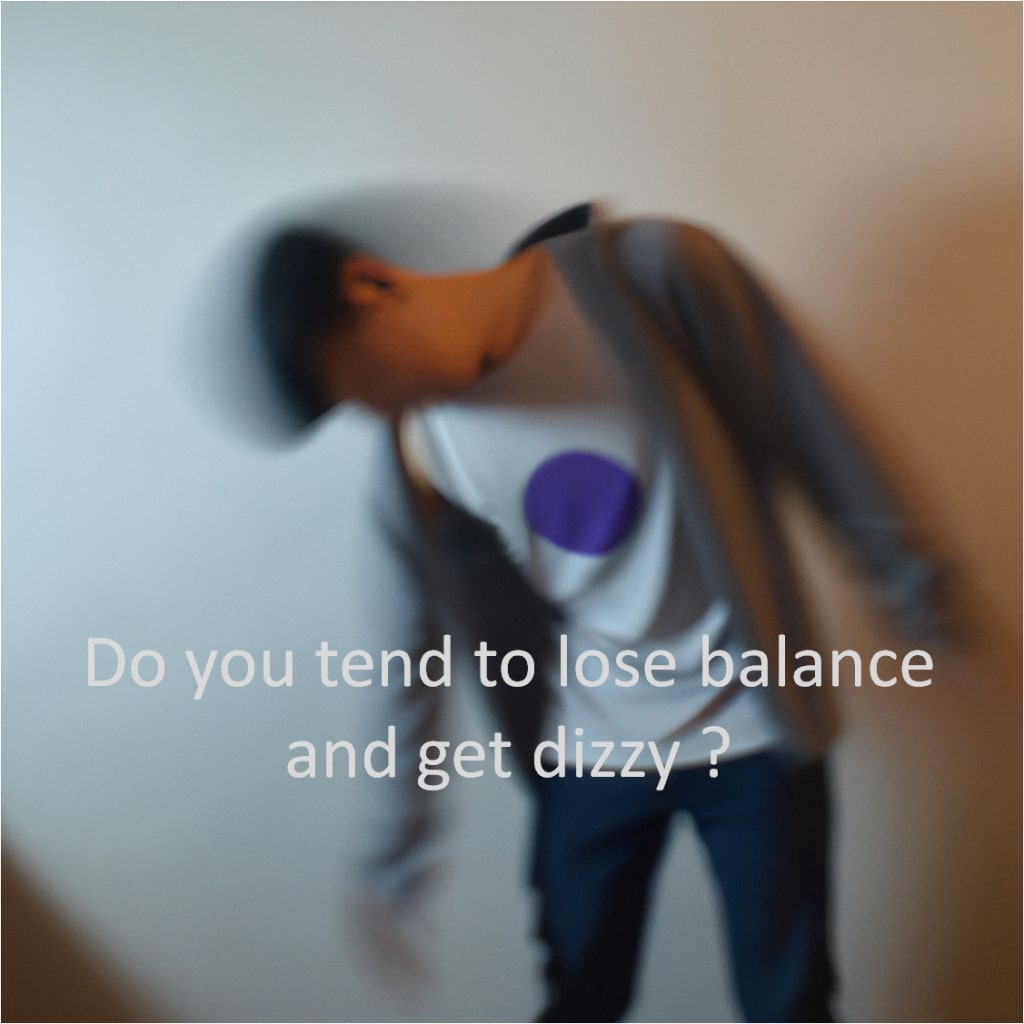Do you tend to lose balance and get dizzy?
Don't let it take away your quality of life

Losing balance and becoming dizzy are common symptoms that can be caused by a variety of factors. These symptoms can be experienced by people of all ages and can significantly impact a person's quality of life. In this essay, we will discuss the causes of balance problems and dizziness, their symptoms, and their impact on daily life.
Balance is the ability to maintain a stable position or posture while performing various activities, such as standing, walking, and running. Balance is controlled by a complex system that involves the inner ear, the brain, and the sensory nerves. Any disruption in this system can lead to balance problems and dizziness.

What are common causes ?
One of the most common causes of balance problems and dizziness is inner ear disorders. The inner ear is responsible for sensing the position and movement of the head, which helps to maintain balance. Disorders of the inner ear, such as vestibular neuritis, Meniere's disease, and benign paroxysmal positional vertigo (BPPV), can cause dizziness and loss of balance.
Vestibular neuritis is an inflammation of the vestibular nerve, which connects the inner ear to the brain. This condition can cause sudden onset vertigo, which is a feeling of spinning or whirling. The symptoms of vestibular neuritis can last for several days or weeks and can be accompanied by nausea and vomiting.
If you are interested in alternative remedies, click here
Meniere's disease is a disorder of the inner ear that is characterized by episodes of vertigo, tinnitus, and hearing loss. The exact cause of Meniere's disease is unknown, but it is thought to be related to changes in the fluid pressure within the inner ear.
BPPV is a condition in which tiny calcium carbonate crystals in the inner ear become dislodged and move into the wrong part of the inner ear. This can cause a feeling of spinning or dizziness, which can be triggered by certain head movements.
Other causes of balance problems and dizziness include neurological disorders, such as stroke, Parkinson's disease, and multiple sclerosis. These conditions can cause damage to the nervous system, which can affect the body's ability to maintain balance.

What are common symptoms ?
Symptoms of balance problems and dizziness can vary depending on the underlying cause. Some common symptoms include a feeling of unsteadiness, difficulty walking, falling or stumbling, spinning or whirling sensation, lightheadedness, and nausea.
If you are interested in alternative remedies, click here
Balance problems and dizziness can significantly impact a person's daily life. They can make it difficult to perform routine activities, such as walking, driving, and working. They can also increase the risk of falls and injuries, particularly in older adults.
Are there treatements available ?
The treatment of balance problems and dizziness depends on the underlying cause. Inner ear disorders, such as vestibular neuritis and BPPV, can often be treated with exercises that help to reposition the calcium crystals in the inner ear. Medications, such as anti-nausea drugs and steroids, may also be prescribed to alleviate symptoms.
Neurological disorders, such as stroke and Parkinson's disease, may require more specialized treatment, such as physical therapy and medication management.
Prevention of balance problems and dizziness involves maintaining a healthy lifestyle, including regular exercise, a balanced diet, and adequate hydration. It is also important to avoid alcohol and drugs that can affect the nervous system.
If you are interested in alternative remedies, click here
In conclusion, losing balance and becoming dizzy are common symptoms that can significantly impact a person's quality of life. These symptoms can be caused by a variety of factors, including inner ear disorders, neurological disorders, and medication side effects. Symptoms can include a feeling of unsteadiness, difficulty walking, falling or stumbling, spinning or whirling sensation, lightheadedness, and nausea. Treatment depends on the underlying cause and may involve exercises, medications, or specialized therapy.
About the Creator
Enjoyed the story? Support the Creator.
Subscribe for free to receive all their stories in your feed. You could also pledge your support or give them a one-off tip, letting them know you appreciate their work.





Comments
There are no comments for this story
Be the first to respond and start the conversation.